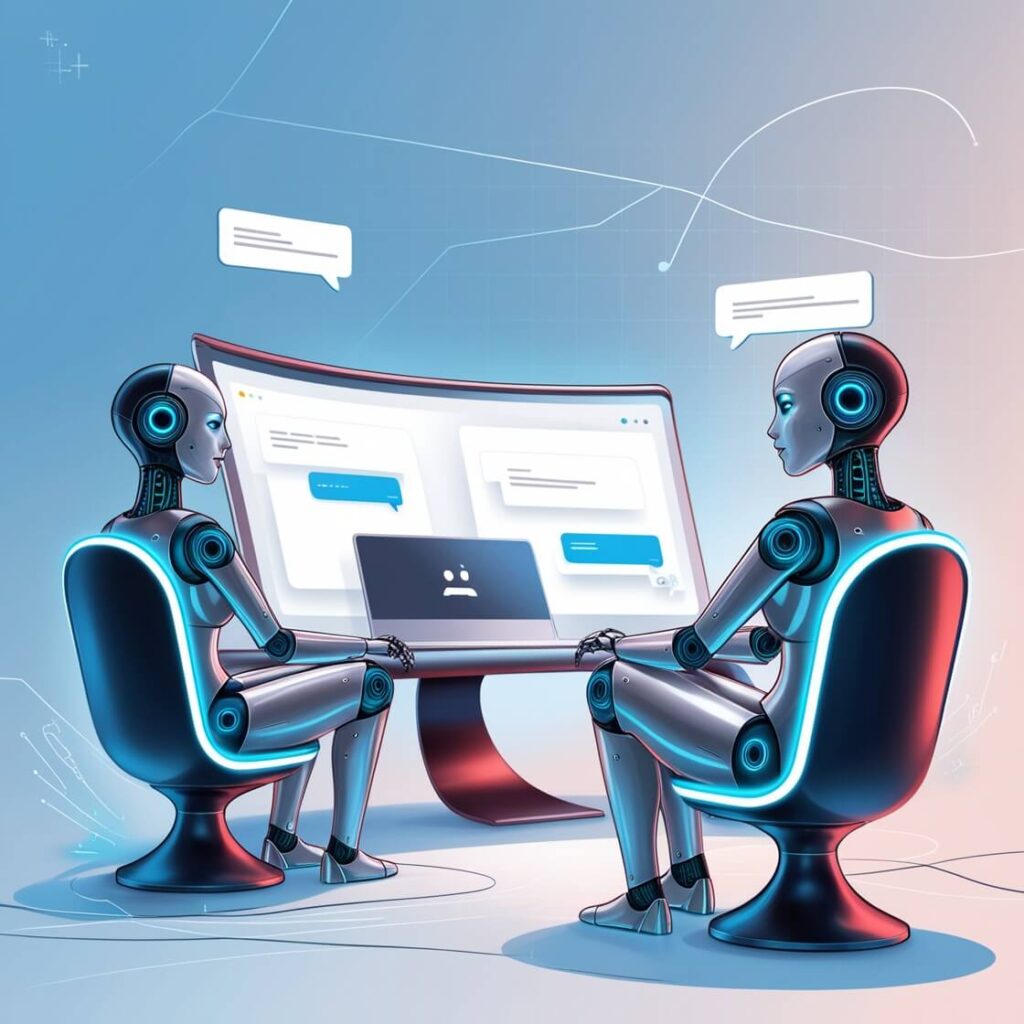AI for Small Business – 9 Best Solutions for 2024
AI for Small Business - 9 Best Solutions for 2024

Whoa, hold onto your hats, small business owners! Imagine cutting your workload in half while doubling your business growth – that’s the power of AI for small businesses in 2024. It’s like having a super-smart assistant who never sleeps, doesn’t ask for raises, and can juggle a million tasks at once. Pretty cool, right?
AI for Small Business Solutions:
- AI-Powered Customer Service Chatbots
- Predictive Analytics for Inventory Management
- AI-Driven Marketing Automation
- Intelligent Accounting and Bookkeeping
- AI for Enhanced Cybersecurity
- Natural Language Processing for Social Media Management
- AI-Assisted Hiring and Recruitment
- Voice Assistants for Productivity
- AI-Powered Sales Forecasting
I remember when I first dipped my toes into the AI waters for my own small business. Man, was I skeptical! I thought AI was just for big tech companies with deep pockets. Boy, was I wrong! These days, AI solutions are more accessible and affordable than ever for us little guys.
In this article, we’re gonna dive into 9 game-changing AI solutions that can transform your small business operations. Trust me, by the time we’re done, you’ll be itching to give some of these a try. So, grab a coffee (or your beverage of choice), and let’s explore how AI can supercharge your small business!
Understanding AI for Small Business: A Quick Primer

Alright, let’s break this down in plain English. When we talk about AI for small businesses, we’re not talking about robots taking over your office (though that’d be kinda cool). It’s more like having a super-smart software buddy that can learn and make decisions to help your business run smoother.
In my experience, the benefits of adopting AI in a small business are huge. It’s like having a Swiss Army knife for your operations. AI can help you save time, cut costs, make better decisions, and even uncover opportunities you might’ve missed. Plus, it can handle those mind-numbing repetitive tasks we all hate, freeing you up to focus on the big-picture stuff.
Now, I gotta address the elephant in the room – the misconceptions. I can’t tell you how many times I’ve heard small business owners say, “AI? That’s not for me. It’s too complicated/expensive/sci-fi.” Trust me, I thought the same thing! But here’s the truth: AI tools these days are designed with us non-techies in mind. You don’t need a Ph.D. in computer science to use ’em, and they won’t break the bank either.
9 AI for Small Business Solutions:
So, now that we’ve got the basics down, let’s dive into these 90 AI solutions that could be game-changers for your small business. Buckle up!
1. AI-Powered Customer Service Chatbots

Let’s kick things off with a biggie – AI chatbots. These little digital helpers have been a lifesaver for my customer service team. Imagine having someone (or something) that can handle customer queries 24/7, never gets tired, and always maintains a cheery disposition. Sounds like a dream, right?
When I first implemented a chatbot on my website, I was worried it’d feel too robotic and impersonal. But modern AI chatbots are pretty darn impressive. They can understand context, learn from interactions, and even crack jokes (though I’ll admit, some of their punchlines need work).
The best part? These chatbots can handle the bulk of simple customer queries, freeing up your human team to deal with more complex issues. It’s like having a tireless front-line support team that works round the clock.
I remember this one time when our chatbot handled a surge of inquiries during a flash sale at 3 AM. My human team was fast asleep, but our AI buddy was there, answering questions and even helping customers complete their purchases. Talk about a win-win!
For small businesses looking to dip their toes in the chatbot waters, there are plenty of user-friendly options out there. Platforms like MobileMonkey, ManyChat, or Drift offer easy-to-use chatbot builders that won’t require you to code or break the bank. Just remember, the key is to start simple and gradually expand your bot’s capabilities as you learn what your customers need.
2. Predictive Analytics for Inventory Management

Okay, let’s talk inventory management – the bane of many small business owners’ existence. I used to lose sleep over this stuff. Overstock? You’re tying up cash. Understock? You’re missing sales. It felt like a never-ending guessing game.
Enter predictive analytics. This AI-powered solution is like having a crystal ball for your inventory. It crunches numbers faster than you can say “stock control,” analyzing past sales data, seasonal trends, and even external factors like weather or local events to predict future demand.
I’ll never forget the first holiday season after we implemented a predictive analytics tool. In previous years, we’d always either run out of popular items too soon or be stuck with excess stock come January. But with AI on our side, we nailed it. We had just enough inventory to meet demand without overdoing it. The impact on our cash flow was nothing short of amazing.
For small businesses, there are some great tools out there that won’t require a data scientist to operate. Platforms like Inventoro or Lokad offer AI-powered inventory forecasting that integrates with popular e-commerce and point-of-sale systems. These tools can help you optimize stock levels, reduce waste, and ultimately improve your bottom line.
Just a word of advice – don’t expect perfection right off the bat. These systems learn and improve over time, so give it a few cycles to really dial in its predictions. Trust me, the payoff is worth the patience!
3. AI-Driven Marketing Automation

Let’s face it, as small business owners, we wear a lot of hats. And sometimes, the marketing hat can feel particularly heavy. That’s where AI-driven marketing automation comes in, and boy, has it been a game-changer for my business!
Think about it – what if you could personalize your marketing campaigns for each and every customer, at scale? Sounds impossible, right? Well, that’s exactly what AI marketing tools can do. They analyze customer data, behavior patterns, and preferences to deliver tailored content and offers to each individual. It’s like having a marketing team that knows each of your customers personally.
I remember when we first started using AI for our email campaigns. We went from sending the same generic newsletter to everyone, to delivering personalized product recommendations and offers based on each customer’s browsing and purchase history. The results? Our open rates shot up, click-through rates doubled, and sales… well, let’s just say I was doing a happy dance!
But it’s not just about personalization. AI can also optimize your ad spend by predicting which channels and messages are likely to perform best. It’s like having a crystal ball for your marketing budget!
For small businesses looking to get started, tools like Mailchimp, HubSpot, or Marketo offer AI-powered features that can supercharge your marketing efforts without requiring a Ph.D. in data science. Start small, maybe with email personalization, and then gradually expand as you get comfortable with the technology.
Just remember, while AI can do a lot of the heavy lifting, it can’t replace human creativity entirely. Use it as a powerful tool in your marketing arsenal, not as a substitute for genuine, human-crafted messaging. After all, we’re still in the business of connecting with real people!
4. Intelligent Accounting and Bookkeeping

Alright, let’s talk numbers – and no, don’t run away just yet! I know for many of us small business owners, accounting and bookkeeping can feel like necessary evils. But what if I told you AI could make this task not just easier, but dare I say… enjoyable? Okay, maybe “enjoyable” is a stretch, but definitely less painful!
I’ll never forget the days of manually inputting every single transaction, reconciling accounts, and praying I didn’t make a typo that would throw everything off. It was time-consuming, tedious, and frankly, a bit scary. One small mistake could lead to big headaches come tax time.
Enter AI-powered accounting solutions. These smart tools can automatically categorize transactions, reconcile accounts, and even flag potential errors or unusual activity. It’s like having a super-detail-oriented accountant working for you 24/7.
I remember the first time our AI accounting system caught a duplicate payment to a vendor that I had completely missed. It saved us a good chunk of change and spared me an awkward conversation. That’s when I knew – this tech was a keeper!
For small businesses, there are some great AI-enhanced accounting solutions out there. QuickBooks has been incorporating more AI features, and newcomers like Botkeeper and Vic.ai are pushing the boundaries of what’s possible with AI in accounting.
These tools can save you time, reduce errors, and provide real-time insights into your financial health. Plus, when tax season rolls around, you’ll have all your ducks in a row, making your accountant’s job (and your life) much easier.
Just a word of caution – while these AI tools are incredibly smart, they’re not infallible. It’s still important to review the output and understand your financials. Think of AI as your trusty sidekick, not a replacement for financial literacy.
So, are you ready to say goodbye to shoebox accounting and hello to smart, AI-powered financial management? Trust me, your future self (and your accountant) will thank you!
5. AI for Enhanced Cybersecurity

Okay, let’s talk about something that used to keep me up at night – cybersecurity. As a small business owner, I used to think, “Why would hackers bother with little ol’ me?” Boy, was I wrong! Small businesses are often prime targets because they typically have weaker security measures. But here’s the good news: AI is changing the game in cybersecurity, making robust protection accessible to businesses of all sizes.
I’ll never forget the day we had a close call with a phishing attack. An email that looked legitimate almost tricked one of our employees into revealing sensitive information. That was our wake-up call. We needed better protection, and we needed it fast.
That’s when we discovered AI-powered cybersecurity solutions. These smart systems act like vigilant digital guardians, constantly monitoring your network for suspicious activity. They can detect anomalies, flag potential threats, and even take action to neutralize attacks before they cause damage.
What’s really cool is how these AI systems learn and adapt over time. They’re not just following a static set of rules – they’re getting smarter with every attempted attack they encounter. It’s like having a security team that never sleeps and is always improving.
For small businesses, there are some great AI-enhanced security options out there. Tools like Darktrace, CrowdStrike, or even some features in Microsoft 365’s security suite use AI to provide enterprise-level protection without the enterprise-level price tag or complexity.
I remember feeling a huge sense of relief once we had our AI security system in place. It was like having a high-tech moat around our digital castle. And the best part? It runs in the background, doing its thing, so we can focus on running our business instead of constantly worrying about cyber threats.
Now, I’m not saying AI is a magic bullet – good security practices are still crucial. But having an AI-powered system watching your back? It’s a game-changer. So, if you haven’t looked into AI cybersecurity for your small business yet, what are you waiting for? Trust me, your future (hack-free) self will thank you!
6. Natural Language Processing for Social Media Management

Let’s chat about social media – the land of likes, shares, and… headaches for many small business owners. I used to spend hours scrolling through comments, trying to gauge customer sentiment, and wracking my brain for clever post ideas. It was like trying to drink from a firehose of information. Then I discovered the magic of Natural Language Processing (NLP) for social media management, and let me tell you, it’s been a total game-changer!
NLP is like having a super-smart assistant who can read and understand human language at lightning speed. It can analyze thousands of social media posts, comments, and messages in the time it would take us mere mortals to get through a handful.
I remember the first time we used an NLP tool to analyze our social media feedback. We discovered that customers loved a product feature we hadn’t been promoting much. Talk about a lightbulb moment! We quickly adjusted our marketing strategy, and sales of that product line shot up.
But it’s not just about analyzing feedback. NLP can also help with content creation and curation. There are tools out there that can suggest post ideas based on trending topics in your industry, or even draft social media updates for you. Now, I’m not saying you should let AI take over your entire social media presence – after all, authenticity is key. But having AI as a brainstorming partner? Absolutely game-changing.
For small businesses looking to dip their toes into NLP for social media, tools like Hootsuite Insights, Sprout Social, or Brandwatch offer NLP-powered features that can supercharge your social media game. These platforms can help you track brand sentiment, identify trending topics, and even flag potential PR issues before they blow up.
Just a word of advice – while these tools are incredibly powerful, they’re not mind readers. You’ll still need to set the right parameters and use your human judgment to interpret the insights. Think of NLP as your social media co-pilot, not an autopilot.
So, are you ready to take your social media management from overwhelming to awesome? Give NLP a try. Your social media strategy (and your sanity) will thank you!
7. AI-Assisted Hiring and Recruitment

Alright, let’s talk about one of the most crucial yet challenging aspects of running a small business – hiring the right people. I used to dread the hiring process. Sifting through mountains of resumes, trying to spot the right candidates, and worrying about making the wrong choice… it was enough to give me heartburn!
That’s where AI-assisted hiring and recruitment comes in, and let me tell you, it’s been a total game-changer for our team. It’s like having a super-smart HR assistant who never gets tired and can spot patterns humans might miss.
I remember our first time using an AI recruitment tool. We were hiring for a customer service position and had received hundreds of applications. In the past, this would have meant days of manual resume screening. But with AI? The system quickly identified the top candidates based on our criteria, saving us countless hours.
But here’s where it gets really interesting. The AI didn’t just look at keywords on resumes. It analyzed things like career progression, skills alignment, and even writing style to predict which candidates would be the best fit for our company culture. And you know what? Some of our best hires came from candidates I might have overlooked in a traditional screening process.
Now, I know what you’re thinking – “Isn’t using AI for hiring a bit… impersonal?” I had the same concern at first. But here’s the thing: AI doesn’t make the final decision. It’s a tool to help you focus your efforts on the most promising candidates. The human touch is still crucial in the interview and final selection process.
For small businesses looking to dip their toes into AI-assisted recruitment, there are some great tools out there. Platforms like Ideal, Pymetrics, or even some features in LinkedIn Recruiter use AI to streamline the hiring process. These tools can help you write better job descriptions, screen resumes more effectively, and even reduce bias in the hiring process.
Speaking of bias, that’s another big advantage of AI in recruitment. While humans can unconsciously let biases affect their decisions, AI can be programmed to focus solely on qualifications and fit, helping to create a more diverse and skilled workforce.
Just remember, like any tool, AI recruitment software is only as good as the data and criteria you feed it. It’s important to regularly review and adjust your parameters to ensure you’re getting the best results.
So, are you ready to take the headache out of hiring? Give AI-assisted recruitment a try. Your future dream team (and your stress levels) will thank you!
8. Voice Assistants for Productivity

Let’s chat about something that’s become my secret weapon for productivity – voice assistants. Now, I know what you’re thinking. “Aren’t those just for asking about the weather or setting timers?” Oh boy, are you in for a treat!
I remember the day I decided to really explore what my voice assistant could do for my business. It was like discovering a hidden superpower! Suddenly, I had a tireless personal assistant ready to help me 24/7, and all I had to do was ask.
Voice assistants like Siri, Google Assistant, or Alexa can be incredible tools for small business owners. They can help you manage your calendar, set reminders, make calls, send emails, and even control smart office devices. It’s like having your own J.A.R.V.I.S. (minus the cool British accent… well, unless you change the settings).
I’ll never forget the time I was stuck in traffic, running late for a client meeting, and realized I’d forgotten to send a crucial document. No problem! A quick voice command to my assistant, and the email was sent before I even reached the next traffic light. Talk about a lifesaver!
Integrating AI voice assistants into daily operations
But it’s not just about basic tasks. Many voice assistants now integrate with popular business tools and can handle more complex commands. Need to add a task to your project management tool? Check inventory levels? Get a quick summary of your daily sales? In many cases, your voice assistant can handle all of that.
For small business owners looking to maximize their voice assistant’s potential, I’d recommend exploring skills or actions specifically designed for business use. For example, Alexa for Business or Google Workspace integrations can supercharge your productivity.
One of my favorite uses is dictating notes or ideas on the go. Whether I’m brainstorming new product ideas or remembering action items from a meeting, being able to quickly capturethoughts without stopping to type has been a game-changer for my workflow.
Now, I’ll be honest – there was definitely a learning curve. At first, I felt a bit silly talking to my phone or smart speaker in the office. And there were some hilarious misunderstandings as the AI learned to interpret my accent and industry jargon. But once I got the hang of it, the time and effort saved were absolutely worth it.
Just a word of advice – while voice assistants are incredibly convenient, be mindful of privacy, especially when dealing with sensitive business information. Make sure you’re familiar with your device’s privacy settings and be cautious about what information you share verbally in public spaces.
So, are you ready to boost your productivity with the power of your voice? Give it a shot! Start with simple tasks and gradually explore more complex features. Before you know it, you’ll wonder how you ever managed without your AI assistant. Trust me, your to-do list (and your typing fingers) will thank you!
9. AI-Powered Sales Forecasting

Alright, let’s talk about something that used to give me serious anxiety – sales forecasting. As a small business owner, I used to feel like I was just throwing darts in the dark when it came to predicting future sales. It was nerve-wracking, to say the least. But then I discovered AI-powered sales forecasting, and let me tell you, it’s been a total game-changer!
I remember the first time we used an AI forecasting tool. It was like having a crystal ball for our business! The system analyzed our historical sales data, market trends, seasonal patterns, and even factored in things like upcoming promotions and economic indicators. The accuracy of its predictions blew me away.
Improving cash flow management
Now, I’m not saying AI is psychic. There’s still an element of uncertainty in any forecast. But the insights provided by AI have helped us make much more informed decisions about inventory, staffing, and cash flow management.
One of the coolest things about AI forecasting is how it learns and improves over time. The more data it has, the more accurate its predictions become. It’s like having a sales expert on your team who’s constantly getting smarter and more in tune with your business.
Affordable sales forecasting tools for small businesses
For small businesses looking to dip their toes into AI sales forecasting, there are some great affordable options out there. Tools like Salesforce Einstein, InsightSquared, or even some features in platforms like Pipedrive use AI to provide powerful forecasting capabilities without requiring a data science degree to operate.
I’ll never forget the time our AI forecast predicted a sudden spike in demand for one of our products due to a viral social media trend. We were able to quickly ramp up production and marketing efforts, capitalizing on the trend while our competitors were caught flat-footed. It was a major win for us, all thanks to AI!
Now, a word of caution – while AI forecasting is powerful, it’s not infallible. It’s important to combine these AI insights with your own business acumen and market knowledge. Think of AI as a super-smart advisor, not a replacement for human judgment.
So, are you ready to take the guesswork out of sales forecasting? Give AI a try. Your business strategy (and your stress levels) will thank you!
Of course, as with any new technology, there was a learning curve. We had some funny mishaps at first – like the time our system mistook a life-sized cardboard cutout of a celebrity for a real person and counted it in our “customers in store” metric! But as the system learned and improved, the benefits far outweighed any initial hiccups.
Just remember, while computer vision can provide incredible insights, it’s important to use this technology responsibly and transparently. Make sure your customers are aware of any visual monitoring in your store and always prioritize their privacy and comfort.
So, are you ready to give your business a pair of AI-powered eyes? Give computer vision a try. Your inventory management, customer experience, and business insights might never be the same again!
Implementing AI in Your Small Business: Best Practices

Whew! We’ve covered a lot of ground, haven’t we? By now, you’re probably bursting with ideas about how AI could transform your small business. But before you dive in headfirst, let’s talk about some best practices for implementing AI. Trust me, I learned some of these the hard way!
First things first – start small and scale gradually. When I first got excited about AI, I wanted to implement ALL THE THINGS at once. Big mistake. It was overwhelming for both me and my team. Instead, pick one area where you think AI could have the biggest impact and start there. Maybe it’s a chatbot for customer service or an AI tool for social media management. Get comfortable with that, learn from it, and then expand to other areas.
Speaking of your team – employee training and buy-in are crucial. I can’t stress this enough. AI isn’t here to replace your employees; it’s here to empower them. But if your team doesn’t understand or trust the AI tools, you won’t see the full benefits. Invest time in training and be open to feedback. Some of our best ideas for using AI came from employees once they understood its potential.
Measuring ROI and adjusting implementation strategies
Now, let’s talk about measuring ROI. It’s easy to get caught up in the coolness factor of AI, but at the end of the day, it needs to benefit your business. Set clear goals for what you want to achieve with AI and track relevant metrics. Maybe it’s customer satisfaction scores for your chatbot or time saved on inventory management. Whatever it is, make sure you’re measuring it.
One thing I’ve learned is the importance of staying flexible. AI technology is evolving rapidly, and so are best practices for using it. Be prepared to adjust your strategies as you learn what works best for your specific business. What worked great for another company might not be the perfect fit for yours, and that’s okay.
Data quality is another crucial factor. Remember, AI is only as good as the data it’s trained on. Make sure you have clean, accurate data to feed your AI systems. Garbage in, garbage out, as they say.
Lastly, don’t forget the human touch. AI is an incredibly powerful tool, but it shouldn’t completely replace human interaction in your business. Use AI to handle repetitive tasks and provide insights, but maintain that personal connection with your customers and employees. It’s often the human element that sets small businesses apart.
Implementing AI in your small business is a journey, not a destination. There will be bumps along the way, but don’t get discouraged. The potential benefits – increased efficiency, better decision-making, improved customer experiences – are well worth the effort.
So, are you ready to take your small business into the AI-powered future? Remember, start small, keep learning, and don’t be afraid to experiment. The world of AI is full of possibilities for small businesses like ours. Let’s embrace it!
Conclusion
Wow, what a ride! We’ve explored 9 game-changing AI solutions that have the power to transform small businesses. From chatbots that never sleep to computer vision systems that give your business super-powered eyes, the possibilities are truly exciting.
As we’ve seen, AI isn’t just for tech giants anymore. It’s becoming more accessible and affordable for businesses of all sizes. Whether you’re looking to streamline your operations, boost your marketing efforts, or provide better customer experiences, there’s an AI solution out there that can help.
Remember, the key is to start small. Don’t feel like you need to implement every AI solution we’ve discussed. Pick one or two that align with your business goals and give them a try. Maybe start with that AI-powered chatbot to improve your customer service, or try out some predictive analytics to optimize your inventory management.
As you dip your toes into the AI waters, keep in mind that technology is constantly evolving. Stay curious, keep learning, and be open to new possibilities. The AI solution that’s perfect for your business might be just around the corner.
I can’t stress enough how important it is to stay adaptable. Your first AI implementation might not be perfect, and that’s okay! Learn from it, adjust your approach, and keep moving forward. The businesses that thrive in the AI age will be those that can adapt and evolve alongside the technology.
Now, I’d love to hear from you! Have you already implemented AI in your small business? What has your experience been like? Or maybe you’re just starting to explore AI possibilities – what excites you the most? What concerns do you have?
Drop a comment below and share your thoughts. Let’s learn from each other and navigate this AI-powered future together. After all, that’s the beauty of the small business community – we’re all in this together.
So, here’s to the future of small business – smarter, more efficient, and powered by AI. The possibilities are endless, and I can’t wait to see what we’ll achieve. Now, if you’ll excuse me, I need to go ask my AI assistant to schedule a brainstorming session for our next big idea. Who knows? Maybe our AI will even chip in with some suggestions!
